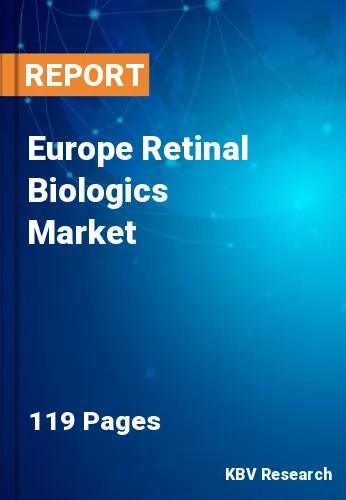The Europe Retinal Biologics Market would witness market growth of 5.7% CAGR during the forecast period (2023-2030).
In both real-world situations and clinical trials, retinal biologics have been shown to produce better therapeutic results than conventional therapies. Patients and healthcare professionals find these therapies very appealing since they offer the potential to slow the advancement of the disease, enhance eyesight, and even reverse some of the consequences of retinal diseases. Typically, biological organisms like microbes, animal or plant cells, or other living entities are used to generate biologics. Retinal biologics are a novel class of drugs that work by aiming at particular indicators in the body of the patient to reduce the symptoms of various systemic or ocular conditions that manifest as eye problems.
Advances in biotechnology and an increase in the elderly population with retinal disorders are driving the market's expansion. Furthermore, retinal illnesses are more common among the elderly. Therefore, the aging population has raised the need for retinal biologic medicines and spurred market expansion.
According to estimates of European Blind Union (EBU), there are 30 million blind and partially sighted people living in Europe. On average, one in thirty Europeans experience vision loss, and the number of partially sighted people outnumbers the number of blind people by a factor of four. Women are more likely than men to go blind or partially blind. One in three seniors over the age of 65 has a visual loss, according to the EBU. 90% of those who are blind or visually impaired are older than 65. This greater estimate explains why it is challenging to determine with precision the prevalence of sight loss among Europe's aging population. Additionally, there are many people with various degrees of sight loss who choose not to report their illness due to ignorance or other personal factors. Consequently, such factors aid in the expansion of the market in the coming years.
The Germany market dominated the Europe Retinal Biologics Market by Country in 2022, and would continue to be a dominant market till 2030; thereby, achieving a market value of $1,153.2 million by 2030. The UK market is exhibiting a CAGR of 4.8% during (2023 - 2030). Additionally, The France market would experience a CAGR of 6.5% during (2023 - 2030).
Based on Indication, the market is segmented into Macular Degeneration, Diabetic Retinopathy and Others. Based on Drug Class, the market is segmented into VEGF-A Antagonist and Others. Based on Distribution Channel, the market is segmented into Hospital Pharmacy, Retail Pharmacy and Online Pharmacy. Based on countries, the market is segmented into Germany, UK, France, Russia, Spain, Italy, and Rest of Europe.
Free Valuable Insights: The Worldwide Retinal Biologics Market is Projected to reach USD 20.7 Billion by 2030, at a CAGR of 5.4%
The market research report covers the analysis of key stake holders of the market. Key companies profiled in the report include Novartis AG, Amgen, Inc., AbbVie, Inc., Bayer AG, Regeneron Pharmaceuticals, Inc., Santen Pharmaceutical Co., Ltd., Bausch Health Companies, Inc., F. Hoffmann-La Roche Ltd., MeiraGTx Holdings plc and Oxurion NV.
By Indication
By Drug Class
By Distribution Channel
By Country
Our team of dedicated experts can provide you with attractive expansion opportunities for your business.

